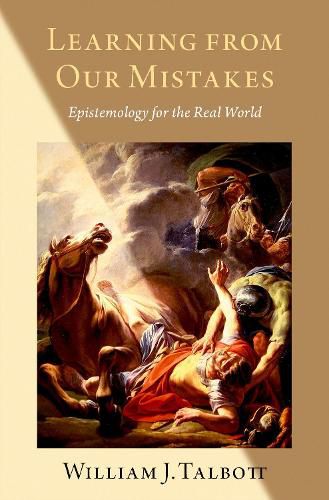Readings Newsletter
Become a Readings Member to make your shopping experience even easier.
Sign in or sign up for free!
You’re not far away from qualifying for FREE standard shipping within Australia
You’ve qualified for FREE standard shipping within Australia
The cart is loading…






In Learning from Our Mistakes: Epistemology for the Real World, William J. Talbott provides a new framework for understanding the history of Western epistemology and uses it to propose a new way of understanding rational belief that can be applied to pressing social and political issues. Talbott’s new model of rational belief is not a model of a theorem prover in mathematics DS It is a model of a good learner. Being a good learner requires sensitivity to clues, the imaginative ability to generate alternative explanatory narratives that fit the clues, and the ability to select the most coherent explanatory narrative. Sensitivity to clues requires sensitivity not only to evidence that supports one’s own beliefs, but also to evidence that casts doubt on them. One of the most important characteristics of a good learner is the ability to correct mistakes. From this model, Talbott articulates nine principles that help to explain the difference between rational and irrational belief. Talbott contrasts his approach with the approach of historically important philosophers, including Socrates, Plato, Aristotle, Hume, Kant, Wittgenstein, and Kuhn, as well as with a range of contemporary approaches, including pragmatism, Bayesianism, and naturalism. On the basis of his model of rational belief, Talbott articulates a new theory of prejudice, which he uses to help diagnose the sources of inequity in the U.S. criminal justice system, as well as to provide insight into the proliferation of tribal and fascist epistemologies based on alt-facts and alt-truth. Learning from Our Mistakes offers a new lens through which to interpret the history of Western epistemology and analyze the complicated social and political phenomena facing us today.
$9.00 standard shipping within Australia
FREE standard shipping within Australia for orders over $100.00
Express & International shipping calculated at checkout
In Learning from Our Mistakes: Epistemology for the Real World, William J. Talbott provides a new framework for understanding the history of Western epistemology and uses it to propose a new way of understanding rational belief that can be applied to pressing social and political issues. Talbott’s new model of rational belief is not a model of a theorem prover in mathematics DS It is a model of a good learner. Being a good learner requires sensitivity to clues, the imaginative ability to generate alternative explanatory narratives that fit the clues, and the ability to select the most coherent explanatory narrative. Sensitivity to clues requires sensitivity not only to evidence that supports one’s own beliefs, but also to evidence that casts doubt on them. One of the most important characteristics of a good learner is the ability to correct mistakes. From this model, Talbott articulates nine principles that help to explain the difference between rational and irrational belief. Talbott contrasts his approach with the approach of historically important philosophers, including Socrates, Plato, Aristotle, Hume, Kant, Wittgenstein, and Kuhn, as well as with a range of contemporary approaches, including pragmatism, Bayesianism, and naturalism. On the basis of his model of rational belief, Talbott articulates a new theory of prejudice, which he uses to help diagnose the sources of inequity in the U.S. criminal justice system, as well as to provide insight into the proliferation of tribal and fascist epistemologies based on alt-facts and alt-truth. Learning from Our Mistakes offers a new lens through which to interpret the history of Western epistemology and analyze the complicated social and political phenomena facing us today.